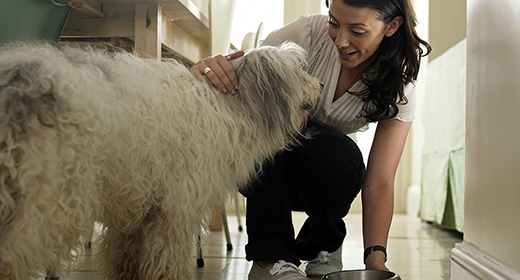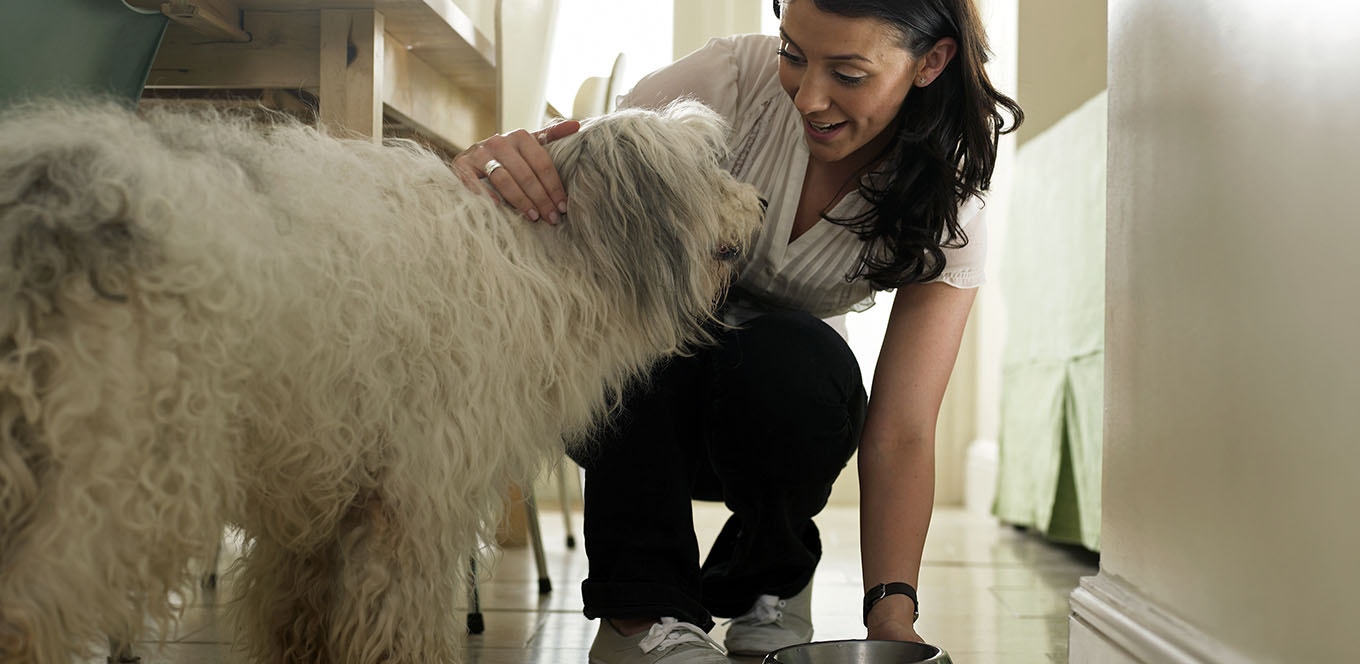

Dogs hit maturity around 7 years of age (5 years for larger dogs). It's not uncommon for them to live as long as 15 years. As your pet enters his golden years, his activity level might slow down and common conditions such as arthritis, diabetes, and kidney disease may arise. “It is so more important to monitor the eating habits of older pets,” stresses Tom Carpenter, DVM, president of the American Animal Hospital Association. “Generally, older pets do not need as much protein, sodium, and phosphorus. But your veterinarian needs to address this for your individual pet,” he says, adding that semiannual vet visits are recommended for an older animal.
Some mature dogs are prone to obesity. To test whether your dog is at a healthy weight, move your hands along his sides. If you can feel his ribs (but don't see them), he's doing okay. But if you feel a fat covering, or you visibly notice a rounded abdomen, he might be overweight. Exercise is still important for a senior dog, and if he's gained weight, you want to look for a low-fat weight-control food that contains vitamin-rich fish oils (IAMS™ ProActive Health™ Mature Adult is one good choice).
Other mature pets can become finicky eaters and lose weight as they age. 'Very old pets may actually need a more calorie-dense diet,' Carpenter says. Older dogs can lose their sense of smell and have a harder time chewing their food. To make mature dog food easier to eat, you can top their dry food with room-temperature wet food.
If your dog is gaining or losing a lot of weight, slightly decrease or increase his daily feedings. A sudden change in weight or appetite might be a sign of disease, so you should check with your vet. Water is also essential. 'Older pets are at a higher risk of dehydration,' Carpenter says. Provide a clean bowl with fresh water at all times.



With so many choices, finding a good puppy food can seem outright daunting. Well, it’s about to get a little easier. Watch as Dr. Katy Nelson takes you through the ins and outs of puppy nutrition with information on everything from age appropriate dog food, to the importance of feeding schedules.
Hi, I'm Dr. Katy Nelson with IAMS. Today we're going to talk about dog nutrition, and what you should look for in your puppy's food. Just like infants, puppies require different levels of nutrients than older dogs. Physically, puppies grow fastest during the first six months. The right nutrition is critical to support this rapid growth.
That said, your puppy should only receive premium puppy food until he reaches his adult height and weight. That's typically in the first year for small and medium breeds, and can be up to two years for large and giant breeds. One more thing to consider is that a puppy's energy requirements can be nearly twice that of an adult dog. And since their stomachs are smaller, they need more nutritionally dense food formulated just for puppies to help them meet their energy needs.
There are three types of food: dry kibble, semi-moist—which comes in sealed packages—and moist or canned. Most veterinarians and trainers recommend dry kibble food, because of its fat content, and the fact that moist food can spoil. Dry kibble also helps with tartar control, which is particularly important for his developing teeth.
When you're shopping for food, there are a couple of things you want to look for and keep in mind. Number one, look on the label for a statement that says, 'Formulated to meet the nutritional levels established by the AAFCO dog food Nutrient Profiles for growth.' Number two, read the ingredients list on the back of the package, and look for real meat as the first ingredient. Puppies grow the fastest during the first six months of life, and because growth rates differ among breed sizes, you need to feed a formula designed to address the needs of your puppy's breed and size. Ideally, puppy food should also contain animal based protein for strong muscles.
The protein requirement for growing poppies is higher than that for adult dogs. High quality protein is critical for puppies to create new body tissue as they grow. Calcium for strong bones and teeth, iron for healthy blood, DHA for the brain, central nervous system, and vision. DHA is a key ingredient found naturally in mother's milk, and is important for a baby's neural development. Just like a baby, your puppy's ability to learn depends on healthy brain development.
Prebiotics for healthy immune system, because 65% of your puppy's immune system is in his digestive tract, and high in calories for all the energy a puppy burns. The nutritional needs for puppies differ for different breeds sizes. Large breed puppies grow more quickly. Because of that, they actually need less calcium, so their bones don't grow too fast. Medium breed dogs need a careful balance of calories and nutrients to be sure that they don't gain excess weight, while small breed puppies need nutrient dense food in small bites, because their metabolism tends to be faster, and they have different energy needs than larger dogs.
Another important thing to know is that what is good for humans is not necessarily good for animals. Because proper nutrition is critical for optimal development, and because human food doesn't offer the proper balance of nutrients puppies need, it is important to teach your whole family that feeding your puppy or your dog table scraps is a big no-no, and a major health hazard. Now let's talk about feeding schedules. Just like babies, puppies do best on a regular schedule.
Schedules teach them that there are times to eat, times to play, and times to potty. Obviously, the feeding schedule will largely be dictated by your own personal schedule. But no matter what, it is critical that puppies younger than four months be fed multiple times per day. Depending on your puppy's breed size, at around six months, you can start to limit feedings to twice a day. Also, keep in mind that eating is soon followed by the urge to go to the bathroom. If you work away from your house and are unable to feed and walk your puppy as often as needed, think about hiring a dog walker, or ask a neighbor to help you keep your puppy on his schedule.
For more information on house training, watch 'How to House Train Your Puppy.' Another important nutritional determinant is how much you're supposed to feed your developing puppy. Even though the back of the puppy food bags usually have suggested portion sizes based on weight, they are not always right for your puppy. So it's best to pay attention to your puppy's body and talk to your veterinarian.
Remember, a fat puppy is not necessarily a healthy puppy. Just as childhood obesity can lead to adult health issues in humans, monitoring a puppy's weight is very important to ensure proper development. Treats are another food source to consider when determining portion size. It is important to limit treating to less than 10% of your puppy's daily caloric intake. When selecting treats, hard chew treats are ideal, because they improve dental health through gnawing. Also, try to save treating for training sessions to reward good behavior, but be careful not to overdo it. For more information on training, watch our video 'Puppy training basics.' The last part of puppy nutrition we are going to talk about is water.
Puppies need fresh, clean water available at all times. Like us, it is their most important nutrient. You should change your puppy's water often, at least once a day. Providing fresh, clean water greatly reduces the risk of disease, and therefore keeps your pet happy and healthy. I'm Dr. Katy Nelson for IAMS, and I hope that you found this helpful as you welcome your new addition into your family.